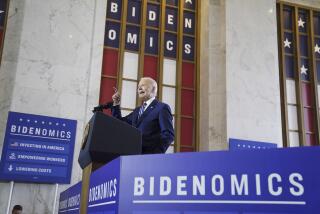Goldman Sachs case could help Obama shift voter anger
- Share via
Reporting from Washington — Fraud charges leveled against the investment bank Goldman, Sachs & Co. center on complex financial dealings. But for President Obama, the accusations against the venerable Wall Street institution offer a chance to revitalize a simple political narrative that he has all but lost in recent months: that he and his party are protecting ordinary Americans victimized by the economic meltdown.
Republicans have been notably successful in mounting populist attacks on the administration, even framing the pending legislation that would increase regulation of Wall Street as a recipe for perpetual bailouts by taxpayers. Now the Goldman case gives the administration a chance to send a countervailing message that government intervention is essential in the face of unregulated trading that favors well-connected insiders.
Treasury officials were all smiles Friday after the Securities and Exchange Commission charges against Goldman Sachs were announced. The SEC, an independent commission, contends that Goldman stacked the deck on billions of dollars in mortgage securities in favor of insiders and against unknowing investors, a charge Goldman denies.
The Goldman case comes along at a time when the Democrats need help. Obama’s approval rating is tumbling and independent voters are disillusioned with his leadership. Unemployment is expected to hover near 10% nationally for the rest of the year.
White House officials can’t bank on a sudden surge in the economy coming to their rescue for the midterm elections. So they are hoping they can redirect voter anger by accusing the GOP of coddling large banks.
In his weekly address Saturday, Obama took aim at Republicans and said that party leaders met last week with two dozen top Wall Street executives “to talk about how to block progress” on new regulatory initiatives.
Obama said the Republican assertion that regulatory measures will lead to more bailouts by taxpayers was “cynical and deceptive.”
“Every day we don’t act, the same system that led to bailouts remains in place -- with the exact same loopholes and exact same liability,” Obama said.
Daniel Pfeiffer, White House communications director, said the coming months offer an opportunity “to make a very compelling case to the American people about how the Republicans have put their short-term political interests over the long-term interests of the country. . . . In this environment there is great political peril in standing with the big banks to defend the status quo. And that is the path the Republicans have very clearly chosen.”
The strategy puts Republicans in a delicate spot because they risk alienating the “tea party” activists if they appear too cozy with big financial institutions. But Obama has vulnerabilities of his own. Goldman Sachs employees contributed nearly $1 million to his 2008 presidential campaign, the second-largest source of his donations, according to the Center for Responsive Politics.
As the midterm elections approach, Democrats are weaving a narrative that relies on three villains: banks, corporations and insurers. Party officials say they have targeted all three on behalf of average voters.
The new healthcare law chipped away at insurance companies. A push to curb campaign donations would restrict the political clout of large corporations, which were given new freedom to make political donations in a Supreme Court ruling in January. And the financial regulatory legislation moving through Congress would rein in banks that have the potential to crash the economy through dubious practices, Democrats say.
“We think this is a continuing point of differences,” said Sen. Robert Menendez of New Jersey, chairman of the Democratic Senatorial Campaign Committee. “It’s about whose side you are on. Elections are about choices. I don’t understand how in this environment you can’t be for the type of reforms Democrats are proposing. [Republicans] will be the party of big bailouts, not us.”
But Republicans have their own populist argument, asserting that the Democrats’ regulatory overhaul bill does not close the door on government bailouts of large financial institutions. That position resonates with voters fed up with taxpayer subsidies.
“We simply cannot ask the American taxpayer to continue to subsidize this ‘too big to fail’ policy,” Senate Republican leader Mitch McConnell of Kentucky said in a letter that was signed by all 41 Senate Republicans and released Friday. “As currently constructed, this bill allows for endless taxpayer bailouts of Wall Street.”
Obama will push back hard. White House aides say he will promote what they call “Wall Street reform” next week, possibly in trips outside Washington. And beginning Monday, Obama’s campaign website will carry a new section laying out the case for tighter financial regulation.
At stake are the independent voters who were crucial to Obama’s 2008 victory. A new Gallup poll shows that only 40% of independents believe he deserves reelection, compared with 54% who don’t believe he merits a second term.
“We are on our strongest ground,” proposing new bank regulations, said one Democratic strategist who requested anonymity. “If we can’t win this debate, we deserve to lose.”
Janet Hook in the Washington bureau contributed to this report.
More to Read
Sign up for Essential California
The most important California stories and recommendations in your inbox every morning.
You may occasionally receive promotional content from the Los Angeles Times.










